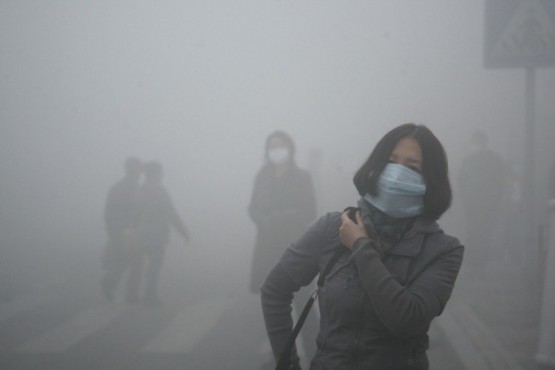Almost exactly two years after Premier Li Keqiang declared “war on pollution” in his opening address to the 2014 National People’s Congress (NPC) in Beijing, legislators and advisers are again preparing to meet in Beijing for the annual “Two Sessions” meetings of the NPC and the Chinese Political People’s Consultative Congress (CPPCC), beginning on Thursday. A report from the South China Morning Post’s Li Jing notes that as participants begin gathering, the capital city is experiencing severe levels of PM2.5 concentration—highlighting China’s battle against air pollution:
Air pollution in the city reached severe levels at 11am on Wednesday as concentration of PM2.5 – tiny particulate pollutants that are most damaging to public health – reached 194 micrograms per cubic metre, according to readings from the US embassy in Beijing.
[…] The Air Quality Index in Beijing stood at about 200, in the unhealthy range. Visibility in the city was significantly reduced as the temperature rose to 15 degrees Celsius during the day.
[…] The National Meteorological Centre, the city’s weather bureau, has forecast that the smog will continue on Thursday, the opening day of the Chinese People’s Political Consultative Conference (CPPCC), and last until Friday. The CPPCC will be followed by the National People’s Congress, which gets underway on Saturday.
[…] A second round of smog is forecast on Saturday and Sunday.[…] [Source]
Readings reported on the @BeijingAir Twitter account, operated by the U.S. Department of State Air Quality Monitoring Program, show that PM2.5 levels on Wednesday were as high as 331. The SCMP report also notes that Beijing is currently on a “yellow” level smog alert, the lowest of China’s four-tiered warning system for air pollution. A “red” alert was issued for the first time in Beijing last December, and last month municipal environmental authorities raised the threshold for the use of that most severe warning. (Explaining the change to the New York Times, environmental researcher Ma Jun said, “There will be multiple times of red alerts in a year if we continue using the current standards, which will bring about a high social and economic cost.”)
At China Dialogue, Tan Cheng reports on signs that environmental issues will be a major focus of China’s 13th Five Year Plan, which will be unveiled as the “Two Sessions” come to a close next week:
At the start of each year, China’s minister of environmental protection delivers a speech at the National Environmental Protection Work Conference, which sets out the country’s environmental priorities for the next twelve months.
The priority, translated from the Chinese, is expressed as follows: ‘putting environmental restoration at the centre of policy and endeavouring to make up for China’s environmental shortfall’.
[…] It is clear that urgent action is needed to make up for China’s environmental shortfall, and this needs to be done early on in the next five years.
“Making up the shortfalls to make progress,” was one of the terms mentioned in the [draft 13th Five Year Plan] document [passed last October]. The indicated shortfall refers to “constrained resources and environmental deterioration”.
In China, experts have forecast that the poor quality of the environment could become the greatest barrier to achieving prosperity for all. […] [Source]
At Reuters, Sui-Lee Wee and Brenda Goh profile China’s Minister of Environmental Protection Chen Jining to show how central authorities’ prioritization of ecologically friendly development strategies has empowered a ministry once considered China’s “most embarrassing”:
Chen is no free agent – his message is tightly controlled in a country where the environment remains a sensitive issue. He is monitored and chaperoned, and many question how much of the push comes from Chen himself, a quiet professor.
[…] Chen’s power base continues to grow, industry executives and environmental observers say, as China cracks down on factories and polluting industries.
His elevation to the cabinet post was seen by ministry insiders and campaigners as a symbolic appointment, chosen by a government keen to appease public anger over damaging smog levels and environmental degradation with a young, telegenic outsider.
That anger coincides with a collapse in commodity prices and a corruption crackdown that has hit powerful players in oil, gas and resources, hurting those who campaigned for rapid economic growth.
That has left Chen, and the ministry that his predecessor called China’s “most embarrassing” government department, in the spotlight, and won him unusually broad public support. […] [Source]
Following Premier Li‘s declaration of “war against pollution,” authorities have made several moves towards a greener development strategy, while also cautiously managing the narrative on pollution. In November 2014, Xi Jinping signed an informal agreement on carbon emissions with Barack Obama—a move that attracted both criticism and praise. At last year’s “Two Sessions,” environmental issues were also a top priority; however, at the same time the independently produced “Under the Dome” documentary, which Chen Jining publicly praised, quickly met with strict government censorship. Also last March, several environmental protesters were briefly detained after urging further government efforts towards cleaning up air pollution. In May, the State Council released new rules to punish local officials for eco-unfriendly decisions. In December, the COP21 Climate Summit in Paris was extended due to disagreement over the responsibility of developed and developing nations; delegates expressed frustration at Chinese attempts to weaken emissions reporting standards, while some commentators said China was still not doing enough to combat climate change.








